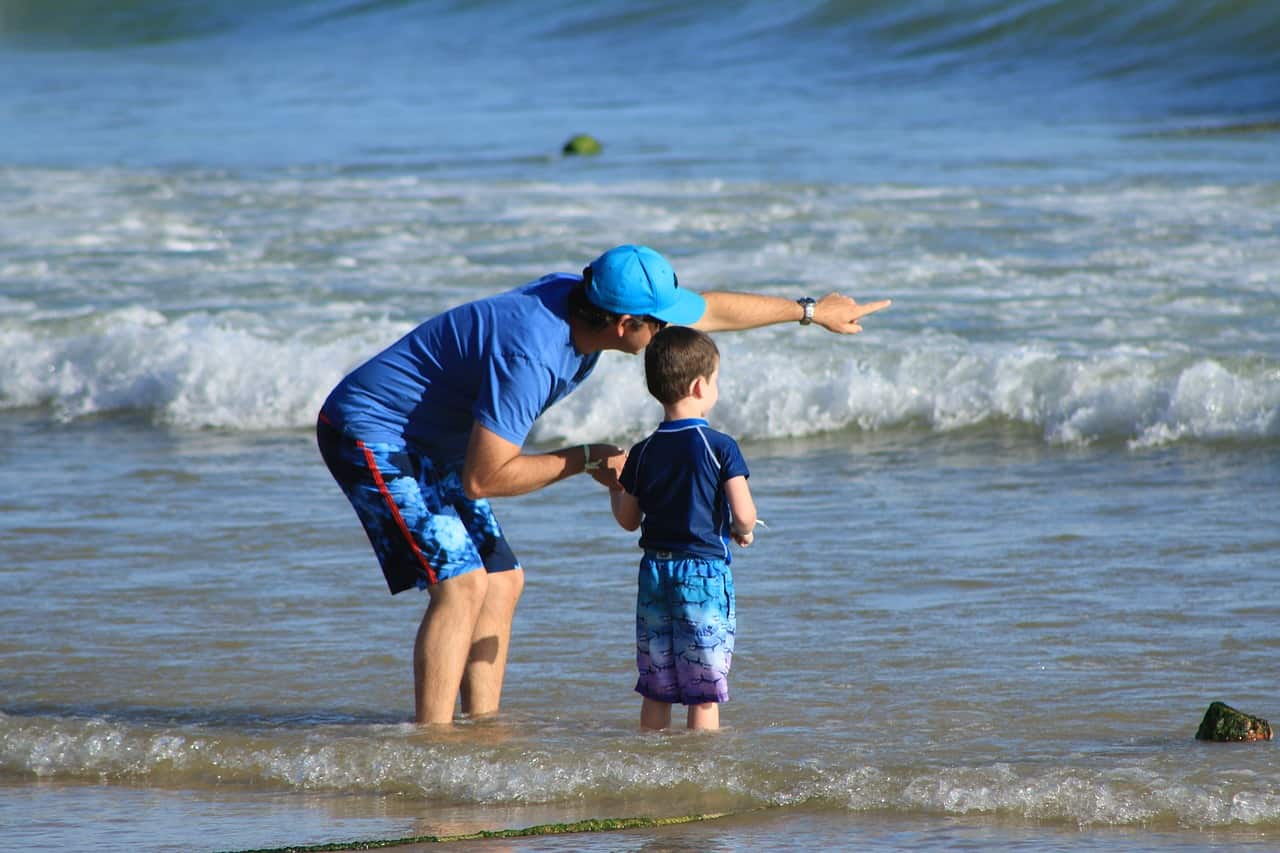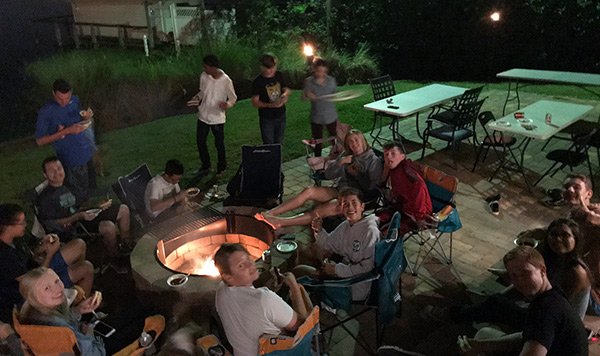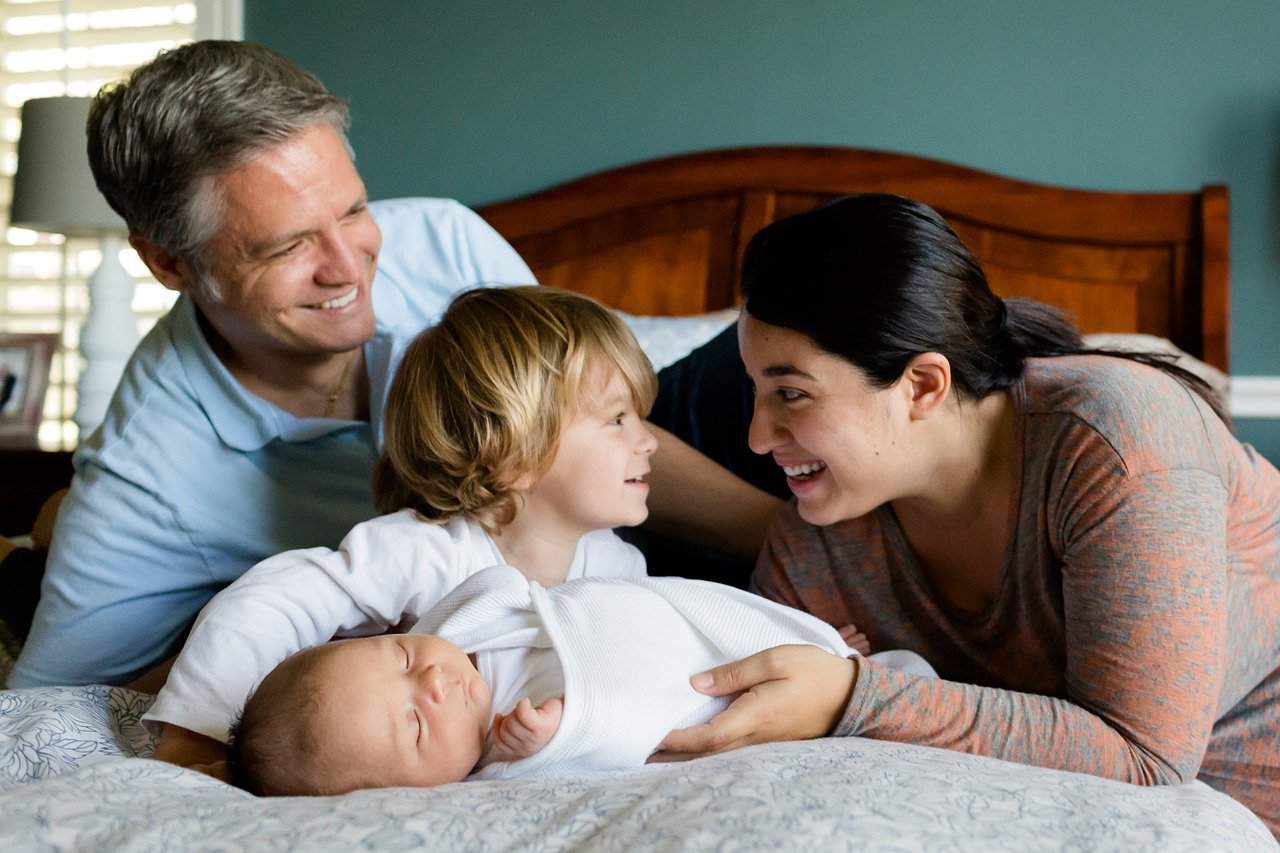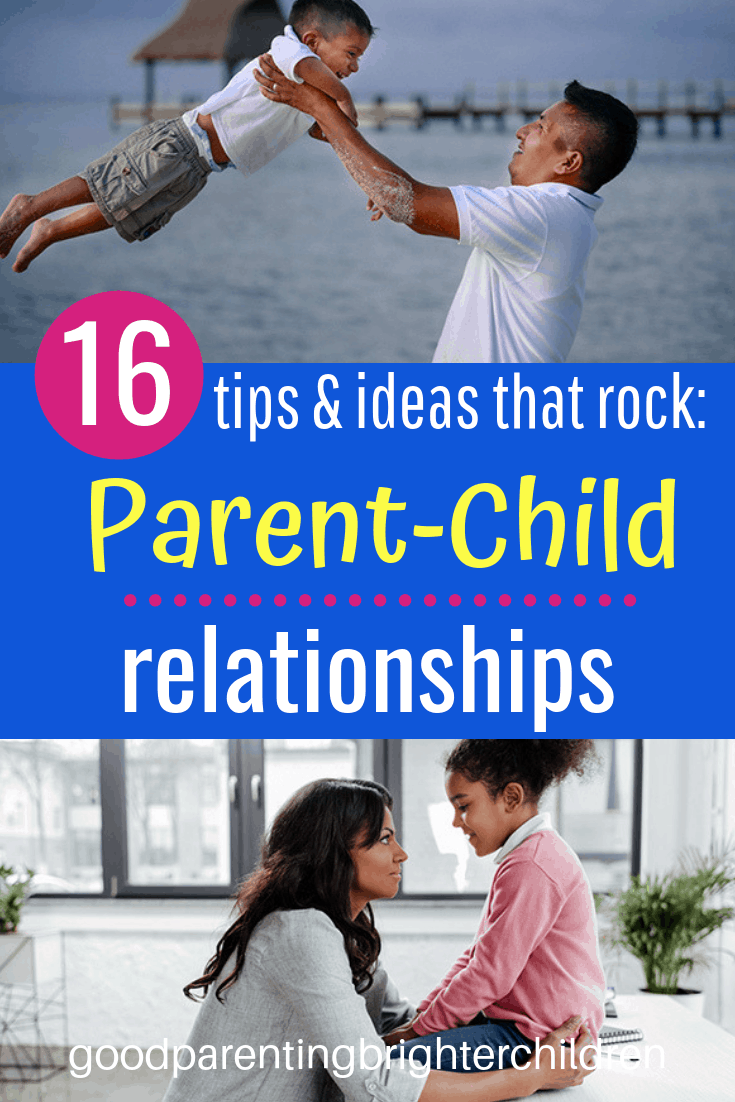Inside: Senseless acts of violence have permeated our schools and neighborhoods. According to experts, strong parent-child relationships are key to preventing these problems. Here are 3 ideas for both mothers and fathers that will build a solid relationship with their children; create emotionally stable kids and teach crucial problem-solving skills.
Parent-Child Relationship
Over the last few years, we’ve been bombarded with numerous news reports of teens and young people shooting students and teachers at schools; setting off bombs at public gatherings, killing people at public places, and bullying others to the point of suicide. Most recently acts of violence toward innocent victims at stores, bars and community festivals have occurred in various cities in the United States.
Violence among young people has become a public health issue costing the government (and taxpayers) $17.5 billion a year in medical costs and loss of productivity.
The Center for Disease Control (CDC) has reported the following statistics:
- More than one-third of homicide victims are young people
- Every day, on average, 13 young people in this country are murdered and an additional 1,600 people visit our hospitals for non-fatal violence-related injuries.
One question that has been asked repeatedly is, “Are these acts of violence preventable?”
According to the CDC…yes.
Here are some programs that have been put in place to address this growing problem:
- Home: Assistance for parents to improve relationships with their children and to help them monitor their child’s activities
- School: School-based programs that build communication skills amongst students, teachers, and parents to help youth understand and solve problems in non-violent ways.
- Community: Communities are getting involved to increase positive social interactions in neighborhoods and cities.
Because of the senseless murders at Sandy Hook Elementary, Marjory Stoneman Douglas High School and other schools, additional programs have been launched such as, “Know the Signs” and most recently, “Say Something Anonymous Reporting System.” They encourage everyone to be on the look-out for outward signs of someone capable of violence and reporting these findings anonymously.
This is the beginning. However, there are other underlying issues responsible for this increasing problem that needs to be addressed as acts of violence continue.
Parent-Child Relationship: They are Crucial!

The Parent-Child relationship is extremely important. Parents: your children need you to be there for them throughout their lives. They depend on your guidance.
Research indicates that prevention measures should first start in the home with the primary responsibility being placed squarely on the shoulders of parents.
Many of the young men who killed innocent children at schools had parents who were oblivious to their problems and that they had access to guns. Some were abusive parents, some denied there was anything wrong with their sons while others fiercely protected them against any outside criticism.
And, almost all of these young men had absentee fathers.
Research shows that fathers play an extremely important role in the emotional development of their sons. Boys model their dads’ behaviors and want their fathers’ approval in everything they do. Boys who have involved fathers do better in school and on standardized tests. And they have a stronger sense of who they are.
Fathers, mothers, you are important to your kids. They need you to be there for them throughout their lives.
Start by:
- Be a parent and not a friend to your child
- Give your children both quality and quantity time
- LISTEN TO YOUR KIDS!
- Engage in activities that include open communication between you and your child
- Teach your children to have respect for authority and for other people
- If your child displays antisocial behavior, get him/her help
- Make your child responsible for his/her actions
- Don’t acquiesce your parental responsibilities to the school, the church, the community or the government.
- Either closely monitor or get rid of violent video games
And…get off your cell phone and tune into your child.

Be a parent, not a friend to your child. Carve out quality and quantity time to be with them. When they are teens and later adults…you will have a strong emotional bond with her/him.
Learn How to Parent
No child comes with a how-to-manual. All parents have to learn from the “school of hard knocks,” and “trial-and-error.” Learn how to parent by:
- Taking parenting classes
- Reading blogs and books about parenting
- Talking to seasoned parents, professionals, pediatricians, etc., about parenting
- Being involved with your child 100%.
And, never, ever give up!
Yes, this requires hard, unrelenting work. But, it’s worth it. You will end up with a child who is emotionally stable, who feels loved, and who will not have any desire to commit unspeakable acts against another human being.
Ask yourself: “In twenty years from now, what kind of a relationship do I want to have with my son or daughter and what qualities do I want him/her to possess?”
If your answer is, “I want to have a close relationship with my children and I want them to be law-abiding citizens and good people,” then begin connecting with your children from birth.
These ideas will help:
3 Ideas to Build a Parent-Child Relationship with Your Kids

If you want to raise emotionally-stable children you need to do things to build the relationship. Kids love date nights with their parents. It’s a time for kids to have their parents to themselves and to have fun.
Here are three powerful, relationship-building ideas. For best results: start these activities when your kids are toddlers.
#1 Date Nights
Date Nights are just what it means…date night with each child every month.
The goal of date nights is to spend time alone with your child away from their siblings and get him/her talking, conversing, and interacting.
The first day of the month, gather your children together, bring out the calendar and mark specific dates you are going to take each one of your children on a separate date night. Once the date is on the calendar it should be “cast in stone,” thereby avoiding a conflict with other activities.
Keep these excursions fun, simple and inexpensive. And get input from your kids on where they’d like to go. Here are some ideas to get you started.
- Park
- Beach
- Swimming
- Zoo
- Music Concert
- Sporting events
- Hiking/Fishing
Go to places where you can carry on a conversation rather than to a movie where you sit mute in a theater or to an amusement park where you race from one ride to another.
Here are three tips to make date nights successful:
#1: Make date nights interactive:
Ask your child open-ended questions (questions that can’t be answered with a “yes,” or “no”) about:
- School
- Friends
- Activities they are involved with
- Favorite music, movies, sports teams,’ etc.
#2: Don’t Criticize
Don’t criticize. Don’t preach. Stay away from topics that can trigger hurt feelings or anger.
#3: Keep it Positive
Focus on having fun, laughing together and enjoying one another’s company.
Rewards:
Date Nights are a simple activity that requires a bit of planning yet gives BIG rewards. You will build a bond of love, trust, and communication. Plus, it speaks volumes to your child that you are willing to sacrifice your time to spend one-on-one time with him/her.
If you start Date Nights when your kids are young when they get to be teens, they’ll want to continue participating in these monthly rituals…which is a plus since some teens don’t want to be seen with their parents.
Last, be consistent. Taking a child on a date for one or two months and then forgetting for the next six, doesn’t cut it. Strong parent/child relationships are built on consistency.
#2 Friday Night Parties
When your kids start middle school/junior high school, parental control changes. Perhaps you knew all the kids your children went to elementary school with, but middle school/junior high school is different. It’s a challenging age group. Your kids are growing up, hormones are kicking in and friends take on a whole new meaning and importance.
We wanted to see what kinds of friends our sons were hanging around with so we started “Friday Night Parties.” They started in middle school and continued through high school.

Friday Night Activities are a great way to get to know the kids your kids are friends with. Throw a pizza party, or barbecue and let your kids invite their friends.
The premise was simple:
- Throw a pizza party or a barbeque every Friday night
- Each child can invite how many friends they want to
Make the rules simple and maintain high standards:
- No smoking
- No drinking
- No recreational drugs
- No sex
- No swearing
Provide simple and fun activities:
- Movies
- Video games
- Board games
- Play Sports: hockey, badminton, baseball, basketball, etc.
- Or just talk
Keep the goals simple:
- Get to know your kids’ friends
- Build trust with your kids and their friends.
Biggest rule: Parents—be there! Socialize, mingle, talk, snoop, and find out all you can about the quality of friends your kids are associating with.
The Hernandez’s of Florida
Tiffany and Patrick Hernandez of Florida are dedicated parents and both are 100% involved with their son, Zach. As hands-on parents, they believe it is important to know the friends their son associates with.
They throw regular parties for Zach and his friends, particularly his friends in the band. (btw: some of the best friends our kids had were kids from band or orchestra).
Tiffany makes the parties simple: she whips up a couple of pots of chili, s’mores and other treats; Patrick is in charge of the bonfire and together they provide music, games and fun for everyone. These bonfire parties have been a HUGE hit and BOTH parents participate and are present at every single event.
Tiffany states, “My husband and I love throwing these parties for Zach and his friends. They have helped us get to know the kids he hangs out with at school and they have helped Zach feel more at ease as he transitioned into high school. They have been a win-win!”

Tiffany and Patrick Hernandez of Florida throw bonfire parties for their son, Zach. They are a huge hit and have helped Zach make a smooth transition to high school
This is just one example of their involvement with their son. He is a priority in their lives and it shows. They are raising a responsible, emotionally-stable son who knows both parents love him and care about what he does and who he chooses for friends. If you want to read more about the Hernandez family and the fun parties they throw for their son, click here.
#3 Personal One-on-One Interviews
If you are looking for something that will build a lifelong relationship with each of your children try personal interviews.
Here’s how they work:
Each week set aside a specific day and time to sit down with each of your children for a personal interview. They should each last between 20-30 minutes and will give you an opportunity to:
- Actively listen to your child’s worries, concerns, and fears.
- Find out how your child is feeling about school, friends, and life.
- Teach, not preach
- Observe your child’s personality (do they blame the world for everything that goes wrong or have you taught them to take responsibility for their mistakes?)
- Help your child set goals and problem-solve
If you start interviews when your child is very young, a bond of trust will develop and they will be willing to discuss any problems or concerns they are facing as teens. This is significant because teens are not always willing to open up to their parents.

Personal one-on-one interviews are one of the most powerful activities that you can do with your child. If you do these consistently each week a bond of trust and communication will happen between you and your child.
For interviews to be successful, don’t criticize your child. However, it IS an appropriate time to discuss behavior issues that need changing or topics that require the child to choose another course of action than the one she/he is pursuing.
When we discussed difficult issues with our children, we prefaced the conversation by telling them we needed to talk about “tough topics.” This way, they immediately knew we would be discussing something requiring a change of behavior (more on this below).
Parent-Child Relationship: Teach Problem-Solving and Decision-Making Skills
Interviews also provide an excellent opportunity to teach children how to problem-solve and make decisions. Children need these skills and they need their parents to help them develop these skills. In the process, children learn that challenges are stepping stones to growth, rather than stumbling blocks to failure.
Every problem requires making decisions and weighing options. To assist in this, we taught our children this simple, visual/kinesthetic exercise:
- Take a piece of paper and fold it in half
- At the top of one side write the word, “Pros,” and the other side write the word, “Con’s”
- Write down all the positive reasons for doing a particular action under “Pro’s.”
- Write down all the negative reasons for doing the same action on the other side under “Con’s.”
- Compare/contrast each side of the paper (problem-solving)
- Make a decision
The key to this exercise is taking the time to actually write down each reason with a pen and paper. Why? Because seeing is believing and when seeing the choices and consequences on paper the decision becomes clearer.
It can apply to any situation young people face that requires making a balanced decision or solving a problem such as issues with friends at school or in the neighborhood, drugs, alcohol, college, a career, a job, etc.
It doesn’t mean they will always make perfect decisions, but going through the process will build their confidence.
For example, when our sons had disagreements with friends at school, or when they were bullied (and most kids are bullied at some time or another), or when they were unfairly treated, we went through this exercise to help them see and understand how best to solve the problem and react to the situation.
As parents, it’s hard to watch your child in pain when others mistreat them. We need to protect them against bullies and such, but at the same time, teach them problem-solving skills that don’t involve violence.
Express Love
Interviews are a good time to express love to your child. Every couple of months, give your child a piece of paper where you have answered the following statements about them:
- I love you because…
- I like you because…
- I admire you because…
- I have fun with you when…
- I respect you because…
- I find you humorous because…
Try to imagine how you would feel if someone handed you a paper describing the above statements about YOU!
Why a Formal Interview?
Some people have asked me, “Why do I have to have a formal weekly interview with my child—I’m available to talk to him anytime—what’s the big deal about a set time?”
Good point!
Every child, like every adult, communicates differently. Some children are very open and bold, other children are more quiet and shy, while other children are somewhere in between.
During one-on-one interviews communication differences emerge, personality differences surface and parents can observe and seek to understand these differences and the best way to reach each child.
Open communication between parents and children doesn’t just happen—it has to be planned for and worked at.

If you want a strong emotional bond with your child, conduct weekly interviews with him/her. They give you an opportunity to find out how your child is feeling about a lot of things such as friends, school, hopes and dreams
Conducting Regular Interviews = Your Kids Listening to You Even as Teens
Starting interviews when your children are young will pay big dividends when they get to be teens. The biggest thing is: you’ve listened to them over the years, now they’ll listen to you…even when the topic is tough.
When one of our sons turned 16, he and his friends began to pursue a self-destructive path. We decided to intervene. We talked to our son about the choices he was making, his responsibilities and the consequences involved. We stressed that while some choices may seem harmless, even insignificant, they can have far-reaching and often unanticipated effects. We told him the choice was his, but so were the consequences.
As is often the case, the situation proved to be a difficult and stressful balancing act. On the one hand, as parents, there is the urge to forcefully compel our children to act in accordance with our desires—to mandate obedience to parental authority.
On the other hand, a contrasting impulse to allow our children to make their own choices. There is no easy solution. The former risks alienating our children into an emotional state of arrested development, while the latter opens the door for our children to make ill-advised decisions replete with potentially devastating consequences.
It’s easy to demand obedience and deny our children agency. However, if children are not allowed to make choices and suffer consequences, they will very likely become submissive, dependent, and weak-willed adults, incapable of necessary problem-solving skills to navigate the harsh realities of society.
For six months, we watched the situation get worse. Finally, during one interview we asked him if he would be willing to give up these friends and find new ones. It was not an easy request. These were his lifelong friends. What we were asking seemed unfair, but we felt it necessary for his long-term wellbeing.
He made the break.
Some people might say we were lucky. Luck had nothing to do with it. Interviews work. They work for you as a parent, and they work for the child. Interviews give you a time to analyze your present parenting goals, to discover new and better ways to approach each child and to change and refine your methods of parenting to complement the unique characteristics of each child.
I can say with certainty that if you consistently, week after week, interview your children with love and kindness when the day comes that they need to listen to you on important, life-threatening issues…they will.
Parents are a lot of different things to their children—their protector, provider, example, hero, counselor, and confidante—all things that can happen when you do these relationship-building activities.
You can access the 2-minute video here.
Do you have a special activity that you do with your children that has been successful in building a strong relationship with them? Please share it in the section below.
Want to remember this post? Post, “Behind the Scenes: 3 Ways to Rock Your Parent-Child Bond,” to your favorite Pinterest board!









Thank you, Tiffany, for your insightful comments–I agree with everything you said regarding a parent’s involvement with their children. Yes, we are creating the next generation so it becomes a heavy responsibility for us as parents, but one (as you stated) that has many rewards. You and your husband are amazing examples of what parenting is all about…involvement with your child and being interested in them on every level. Thank YOU for being a part of this blog and sharing your parenting ideas that work! Zach is fortunate to have such great parents! And you are blessed to have him as your son!
Another beautifully written post, Sharlene. The world we live in is scary. I often hear people complaining about how bad things have gotten and “they wish things were different”. I don’t necessarily think that they don’t want to help make a difference, I believe it’s more that they don’t know how to. As parents, we are creating the next generation. Starting in the home, with our own children, will make a difference! Where do you start with your children? Right here on your blog. Your examples and strategies are simple and easy but can make a huge difference in your child and the world as a whole. Thank you for always “keeping things real” and not sugar coating things. Parenting isn’t easy, but most things in life worth putting the effort in aren’t. Thank you for allowing me to be a part of this post! I can’t wait to try out the “interviewing” process with Zach.
What a great family you have. Your family activities and interest in one another as individuals, as well as being family members who live together under one roof, have formed not only a great bonding within your own family unit but also will have (I predict) produced very good examples for the other young people outside your family circle. Those that have been included/invited to spend time in your home or at lakeside, etc, will have had very good role models and excellent instruction in how successful families are created. I am so pleased to have read about your success. It is not one success, but MANY!!!
Thank you so much for your kind words! My husband and I try our best to be involved as much as we can with our son and his friends. I love having them over and always welcome it. If they are at my house, I know what they are doing and can keep tabs on them 😉 Again, thank you! ~Tiffany